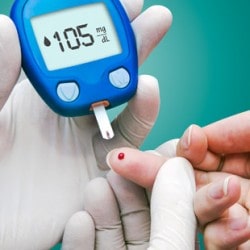Diabetes
Diabetes often referred to by doctors as diabetes mellitus, describes a group of metabolic diseases in which the person has high blood glucose (blood sugar), either because insulin production is inadequate, or because the body’s cells do not respond properly to insulin or both. Patients with high blood sugar will typically experience polyuria (frequent urination), they will become increasingly thirsty (polydipsia) and hungry (polyphagia).

Symptoms of diabetes
- Increased thirst and urination
- Increased hunger
- Fatigue
- Blurred vision
- Numbness or tingling in the feet or hands
- Sores that do not heal
- Unexplained weight loss

Treatments for Diabetes
Diabetes is a serious disease that you cannot treat on your own. Your doctor will help you make a diabetes treatment plan that is right for you — and that you can understand. You may also need other health care professionals on your diabetes treatment team, including a foot doctor, nutritionist, eye doctor, and a diabetes specialist (called an endocrinologist).
Treatment for diabetes requires keeping close watch over your blood sugar levels (and keeping them at a goal set by your doctor) with a combination of medications, exercise, and diet. By paying close attention to what and when you eat, you can minimize or avoid the “seesaw effect” of rapidly changing blood sugar levels, which can require quick changes in medication dosages, especially insulin.
